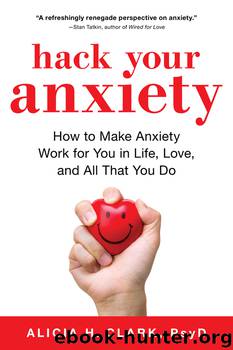Hack Your Anxiety by Alicia H. Clark

Author:Alicia H. Clark
Language: eng
Format: epub
Publisher: Sourcebooks
Published: 2018-08-19T16:00:00+00:00
Make a Plan
Research has shown that the dissipation of anxiety to a manageable level comes not just with the completion of the act, but even just the starting of it. The very decision to take the action can be helpful. An example of this would be just calling and making an appointment with a professional and then putting that task on your calendar. If the anxiety is brewing and you direct it toward an outlet—making that call, setting up that meeting, or writing a draft of that email—you will feel better. A study of anxious college students found that when they actively addressed their negative thoughts and actively picked apart their meaning, their anxiety distress went down.13 Naming and sorting our emotions is taking control and it itself doing something.
Considering possible solutions and planning action is also taking action. It begins the channeling of anxiety’s energy. As Christine Carter explains in The Sweet Spot: How to Accomplish More by Doing Less:
Research shows that simply making a plan to deal with an unfinished task makes a huge difference in our ability to focus on other things without being constantly reminded by our unconscious mind about what else we need to do. It’s not so much about deciding what to do—by making a list or something—as it is about deciding when to do it… As it turns out, our unconscious isn’t nagging us to do the task at hand, but rather to make a plan for when we will get it done.14
That nagging reminder buzzing in your ear, a type of daily whisper anxiety, is most likely anxiety that you will forget to do something important. Planning for when and how we will do it can quiet the whisper. The anxiety might not be about doing the task so much as it’s about forgetting to do it. Scheduling a time or conceiving a plan to organize and send our tax information to our accountant is a more reasonable solution to our anxiety than to stop what we’re doing there and then and launch into such an intensive project only because it popped into our heads.
Robert Epstein, who studied under founder of behaviorism B. F. Skinner, conducted a wide-ranging survey to determine which stress-prevention techniques were the most effective. The winner? Planning. Epstein points to the effectiveness of “fighting stress before it even starts, planning things rather than letting them happen.”15 I see this over and over in my sessions with clients: anxiety diminishes just through the planning itself. Just the thought of action allows the reality of our own control to sink in. This brings a much-needed dose of confidence.
Download
This site does not store any files on its server. We only index and link to content provided by other sites. Please contact the content providers to delete copyright contents if any and email us, we'll remove relevant links or contents immediately.
Should I Stay or Should I Go? by Ramani Durvasula(7667)
Why We Sleep: Unlocking the Power of Sleep and Dreams by Matthew Walker(6725)
Fear by Osho(4738)
Flow by Mihaly Csikszentmihalyi(4697)
Rising Strong by Brene Brown(4459)
Why We Sleep by Matthew Walker(4445)
The Hacking of the American Mind by Robert H. Lustig(4382)
How to Change Your Mind by Michael Pollan(4356)
Too Much and Not the Mood by Durga Chew-Bose(4348)
Lost Connections by Johann Hari(4186)
He's Just Not That Into You by Greg Behrendt & Liz Tuccillo(3900)
Evolve Your Brain by Joe Dispenza(3678)
The Courage to Be Disliked by Ichiro Kishimi & Fumitake Koga(3503)
Crazy Is My Superpower by A.J. Mendez Brooks(3400)
In Cold Blood by Truman Capote(3384)
Resisting Happiness by Matthew Kelly(3341)
What If This Were Enough? by Heather Havrilesky(3311)
The Book of Human Emotions by Tiffany Watt Smith(3309)
Descartes' Error by Antonio Damasio(3278)
